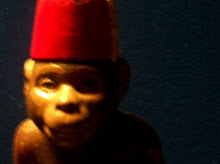Tom Waits' great eruption
By Tom Moon
Inquirer Music Critic
To fully appreciate Tom Waits' new release, it helps to forget everything you know about the human voice. Abandon the quaint notion that God's original instrument should sound pure. Don't expect anything soothing.
Even that mental adjustment may not fully prepare you for "Hoist That Rag," one of 14 audio dramas on the aptly titled Real Gone (Anti **** out of four stars), easily the best Waits effort since 1985's Rain Dogs.
The esteemed chronicler of mythic street bohemia does not "sing" in the conventional sense on "Rag." He bellows at full steam, adopting the attitude of those dangerous despots who communicate via megaphone. As he delivers fervent exhortations ("The ghost bird sings and the gods go begging here, so just open fire as you hit the shore"), Waits' shredded instrument somehow encompasses the full spectrum of sound: Each note blurs together squeaky highs and midrange bleats and low tones that replicate a groaning, half-attached car muffler scraping the pavement.
It's voice as assault weapon. But because the surrounding music is a stately Afro-Cuban beat, "Rag" becomes a study in contrasts - with unruly dissonance serving as another color. The song wouldn't work if Waits was singing pretty. It wouldn't work plain. It needs a fully enraged narrator, pumped with righteous zeal and something like fury.
The disc, in stores today, is a compendium of these fantastical, and willfully odd, Waitsian vocal devices. It's as if - after all the mind games and pondering of 2002's twin set, Alice/Blood Money - Waits, now 54, avoided writing anything cerebral to go straight for the gut.
Real Gone is truly gone - dance music that freeze-frames moments of abandon, then replays them through a surreal lens. Jerky spasms of sound that tell truths of human nature, almost by accident. In terms of sheer sonic turbulence, there's nothing else quite like it in the Waits discography.
The opening track, "Top of the Hill," is a symphony of wheezing and sputtering mouth percussion, generated by Waits sampling and multitracking in a bathroom, that moves with an almost violent lurch. On the spoken-word "Circus," Waits goes noir as a lonely showbiz vet lost in reverie about the good old days, recalling late nights when the music was like "electric sugar" and his pals included folks like "Yodeling Elaine, the Queen of the air, who wore a dollar-sign medallion."
"Trampled Rose," perhaps the most disarmingly beautiful composition here, finds Waits drifting into a fragile, almost tipsy falsetto as he conjures some sad singer in a desolate jazz club at midnight, telling the empty seats about the one great love that got away.
And on the slow, sauntering 11-minute "Sins of the Father," Waits makes an overt lunge in the direction of Louis Armstrong - phrasing in a sleepy, contented burble, he employs the unflappable Satchmo voice to portray a man caught at the existential crossroads, desperate to atone for bad judgments and indiscretions before his sorrow becomes permanent.
Virtually every track - with the notable exception of the haunting soldier's letter home, "Day After Tomorrow," perhaps the most eloquent protest song to emerge this season - connects first on a visceral level, through either elaborate vocal characterizations or equally arresting instrumental textures. On this score, Waits is aided greatly by guitarist Marc Ribot, who's been missing from the fold since Rain Dogs. With his sense of texture and keen instinct sliding from background to foreground, Ribot is the perfect Waits foil. His halting arpeggios provide backbone, framing the voice with the fewest notes necessary to suggest harmony.
Ribot's atmospheres, which reference the blues and Jamaican rock steady, provide a clear space for what Waits has traditionally done best: tell stories. He's been following the same schemers and scammers around the same unsavory streets for decades now, and evidently recognizes the perils of romanticizing the ramshackle in the ways he did before - so now, even his carny clowns sound like dime-store philosophers.
And every now and then, these dissipated characters look up from the perch at the Last Chance Tavern long enough to at least consider, for a moment, more universal questions. As they mull the cruelty of fate ("Make It Rain") or the biggest unknowable of all ("How's It Gonna End"), they become restless seekers in the grand American tradition.
By letting them ramble on in their own distinct voices, Waits transforms his raving lunatics into unlikely oracles. They've wandered so far out, they're really gone. The best they can do is send back warnings from civilization's lonesome edge, in foreboding tones that say more than words can: Don't go here. Too scary.
Thursday, October 07, 2004
voice as assault weapon
A laudable review of the latest Tom Waits in the Philadelphia Inquirer:


